Books

George Friedman is an internationally recognized geopolitical forecaster and strategist on international affairs and the founder and chairman of Geopolitical Futures. Photo by Kevin Vandivier/Genesis Photos
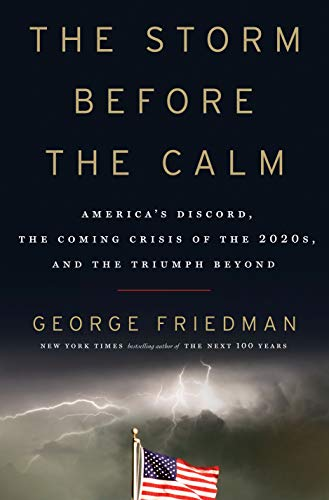
The Storm Before the Calm
The Storm Before the Calm: America's Discord, the Coming Crisis of the 2020s, and the Triumph Beyond.
The master geopolitical forecaster and New York Times bestselling author of The Next 100 Years focuses on the United States, predicting how the 2020s will bring dramatic upheaval and reshaping of American government, foreign policy, economics, and culture.
In his riveting new book, noted forecaster and bestselling author George Friedman turns to the future of the United States. Examining the clear cycles through which the United States has developed, upheaved, matured, and solidified, Friedman breaks down the coming years and decades in thrilling detail.
View More
Buy From Your Favorite Store
Flashpoints: The Emerging Crisis in Europe
New York Times bestselling author and geopolitical forecaster George Friedman delivers a fascinating portrait of modern-day Europe, with special focus on significant political, cultural, and geographical flashpoints where the conflicts of the past are smoldering once again. For the past five hundred years, Europe has been the nexus of global culture and power. But throughout most of that history, most European countries have also been volatile and unstable—some even ground zero for catastrophic wars. As Friedman explores the continent’s history region by region, he examines the centuries-long struggles for power and territory among the empires of Spain, Britain, Germany, and Russia that have led to present-day crises: economic instability in Greece; breakaway states threatening the status quo in Spain, Belgium, and the United Kingdom; and a rising tide of migrants disrupting social order in many EU countries. Readers will gain a new understanding of the current and historical forces at work—and a new appreciation of how valuable and fragile peace can be.
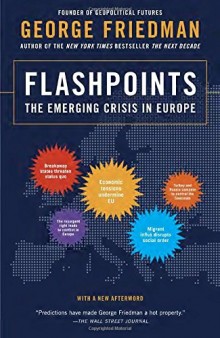
Buy From Your Favorite Store
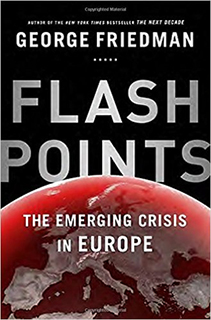
Flashpoints: The Emerging Crisis in Europe
A major new book by New York Times bestselling author and geopolitical forecaster George Friedman (The Next 100 Years), with a bold thesis about coming events in Europe. This provocative work examines “flashpoints,” unique geopolitical hot spots where tensions have erupted throughout history, and where conflict is due to emerge again. “There is a temptation, when you are around George Friedman, to treat him like a Magic 8 Ball.” —The New York Times Magazine With remarkable accuracy, George Friedman has forecasted coming trends in global politics, technology, population, and culture. In Flashpoints, Friedman focuses on Europe—the world’s cultural and power nexus for the past five hundred years . . . until now. Analyzing the most unstable, unexpected, and fascinating borderlands of Europe and Russia—and the fault lines that have existed for centuries and have been ground zero for multiple catastrophic wars—Friedman highlights, in an unprecedentedly personal way, the flashpoints that are smoldering once again. The modern-day European Union was crafted in large part to minimize built-in geopolitical tensions that historically have torn it apart. As Friedman demonstrates, with a mix of rich history and cultural analysis, that design is failing. Flashpoints narrates a living history of Europe and explains, with great clarity, its most volatile regions: the turbulent and ever-shifting land dividing the West from Russia (a vast area that currently includes Ukraine, Belarus, and Lithuania); the ancient borderland between France and Germany; and the Mediterranean, which gave rise to Judaism and Christianity and became a center of Islamic life. Through Friedman’s seamless narrative of townspeople and rivers and villages, a clear picture of regions and countries and history begins to emerge. Flashpoints is an engrossing analysis of modern-day Europe, its remarkable past, and the simmering fault lines that have awakened and will be pivotal in the near future. This is George Friedman’s most timely and, ultimately, riveting book.
Buy From Your Favorite Store
The Next 100 Years: A Forecast for the 21st Century
A fascinating, eye-opening and often shocking look at what lies ahead for the U.S. and the world from one of our most incisive futurists. In his thought-provoking new book, George Friedman, founder of STRATFOR—the preeminent private intelligence and forecasting firm—focuses on what he knows best, the future.
In his thought-provoking new book, George Friedman, founder of STRATFOR—the preeminent private intelligence and forecasting firm—focuses on what he knows best, the future. Positing that civilization is at the dawn of a new era, he offers a lucid, highly readable forecast of the changes we can expect around the world during the twenty-first century all based on his own thorough analysis and research. For example, The U.S.-Jihadist war will be replaced by a new cold war with Russia; China’s role as a world power will diminish; Mexico will become an important force on the geopolitical stage; and new technologies and cultural trends will radically alter the way we live (and fight wars). Riveting reading from first to last, The Next 100 Years is a fascinating exploration of what the future holds for all of us.
View More
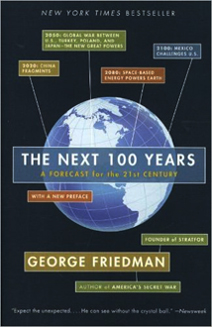
Buy From Your Favorite Store
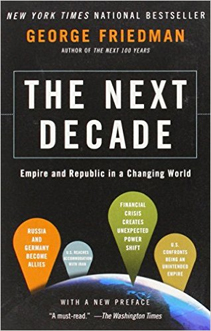
The Next Decade: Empire and Republic in a Changing World
The bestselling author of The Next 100 Years sharpens his focus to the next ten years, specifically the political shifts that will take place, the decisions that will be made, the consequences of those decisions, and how the American president will acknowledge and manage the fact that the United States has become an empire. In the long view, history is seen as a series of events—but the course of those events is determined by individuals and their actions. During the next ten years, individual leaders will face significant transitions for their nations: the United States’ relationships with Iran and Israel will be undergoing changes, China will likely confront a major crisis, and the wars in the Islamic world will subside. Unexpected energy and technology developments will emerge, and labor shortages will begin to matter more than financial crises. Distinguished geopolitical forecaster George Friedman analyzes these events from the perspectives of the men and women leading these global changes, focusing in particular on the American president, who will require extraordinary skills to shepherd the United States through this transitional period. The Next Decade is a provocative and fascinating look at the conflicts and opportunities that lie ahead.
Buy From Your Favorite Store
The Future of War
The Future of War makes a brilliant case that the twenty-first century, even more than the twentieth, will be the American century, and that America’s global dominance will be associated with a revolution in weaponry and warfare as basic as the one that arose with the development of gunpowder five hundred years ago. From the era of flintlocks and cannons to the day of automatic weapons and heavy artillery, the waging of war-while undeniably changing in many aspects-has continued to rely on the technology that began with the use of black powder to expel a projectile through a tube. In The Future of War, the authors argue that this Age of Ballistics is ending and we are entering a fundamentally new period, the Age of Precision-Guided Munitions (PGMs), the so-called smart weapons that will antiquate the traditional way of making war. Where guns and artillery are inherently inaccurate and need to be fired thousands of times to hit one target, these new projectiles are precise and lethally efficient; while ballistic weapons platforms must be brought within range of the battlefield, PGMs can devastate from any distance. The authors show how the innovations in weapons technology will affect America’s defense strategies on land and sea, in air and in space, reshaping our military forces, while confronting us with new strategic challenges as America enters the twenty-first century as the dominant power on the globe.

Buy From Your Favorite Store
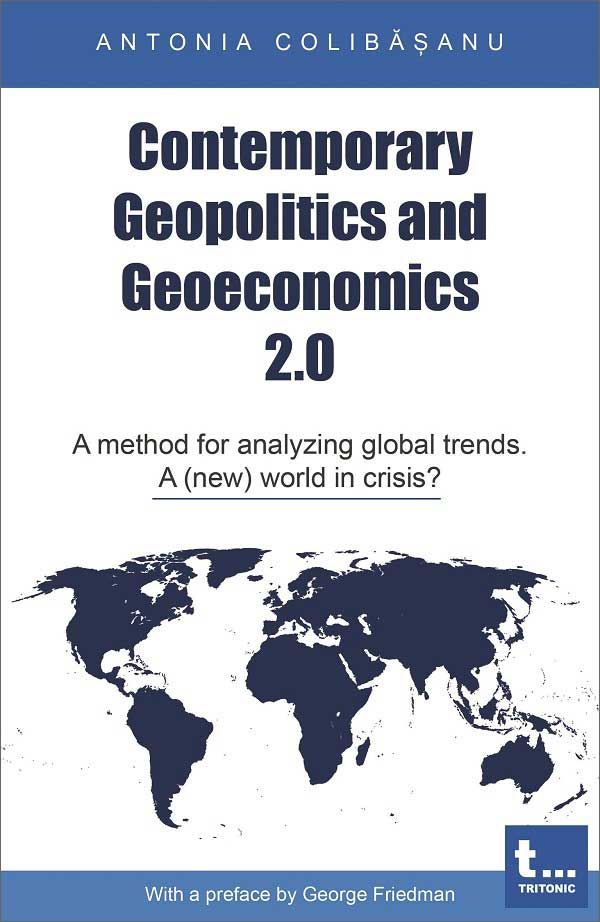
Contemporary Geopolitics and Geoeconomics 2.0
By Antonia Colibasanu
A map contains an abundance of information, if you know how to interpret it. A thorough reading with a trained eye allows the viewer to decipher the impetus behind current events, understand their importance and discern their impact on global stability. Along with geographical borders and topography, we must be aware of the layers of society and how they shape and change the map. Antonia Colibasanu discusses the theories and history of geopolitics. She argues that in order to decode the logic of relations among nations and communities, a methodical, interdisciplinary approach is needed, one that includes geographical, historical, anthropological and socio-economic notions.
Buy From Your Favorite Store
Hizbullah: A Mission to Nowhere
By Hilal Khashan
This book explores the rise of Hizbullah as a direct consequence of both the Iranian Revolution and the entanglement of Lebanon in the Arab-Israeli conflict. Protracted civil war and overwhelming foreign intervention by Lebanon’s neighbors enabled Hizbullah to emerge as the country’s dominant politico-military force. Hizbullah disabled the Lebanese political system and, in its capacity as Iran’s premier foreign proxy, allowed the Islamic Republic to take the lead in the regional tug of war with Israel. In its quest for achieving a distinguished regional status commensurate with its ambitions, Iran used Hizbullah to abort the Syrian uprising, actively contribute to its burgeoning influence in Iraq, and participate in its propaganda war against Saudi Arabia on a range of issues. The renewed U.S. sanctions on Iran coincided with a worldwide campaign to dry up Hizbullah’s sources of funding and compromised its integrity as a critical provider of patronage to its Lebanese Shi’ite base of support. The emergence of Russia as the real power player in Syria made it extremely difficult for Hizbullah to justify the high human cost it incurred to salvage the regime of Bashar Asad. This book examines the rise of Hizbullah and the marginalization and repression of Shi’ites that made them susceptible to exploitation by their sectarian leaders.




 The Geopolitics of the American President
The Geopolitics of the American President